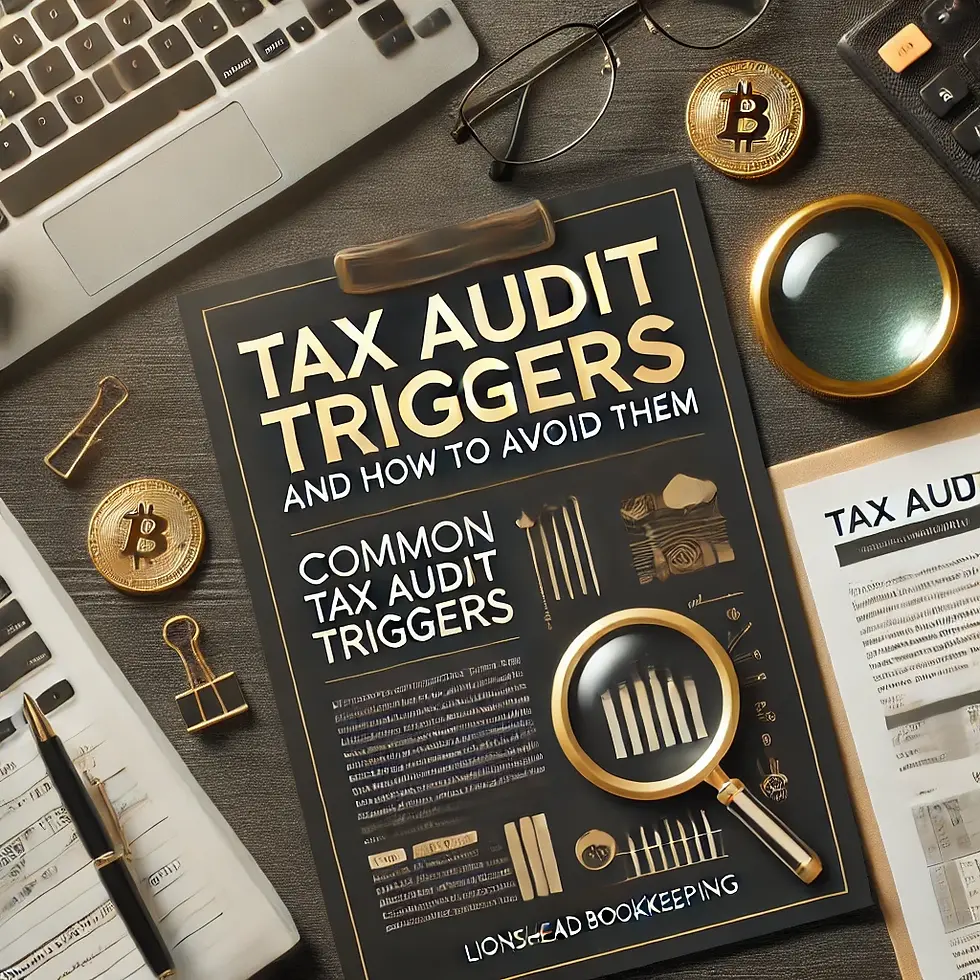Common Tax Audit Triggers and How to Avoid Them
- Matthew Miles
- Mar 9
- 3 min read

Common Tax Audit Triggers and How to Avoid Them
Every business owner dreads the idea of a tax audit. While audits are not necessarily an indication of wrongdoing, they can be time-consuming, stressful, and potentially costly. Understanding common tax audit triggers can help you take proactive steps to avoid unnecessary scrutiny from the IRS. Here are some of the most common reasons businesses get audited and how to steer clear of them.
1. Excessive Deductions
Claiming a high number of deductions compared to your income can raise red flags. While it’s important to take advantage of legitimate tax deductions, ensure they are reasonable and well-documented. Keeping detailed records and receipts for business expenses will help support your claims in case of an audit.
2. Large Cash Transactions
Businesses that deal primarily in cash, such as restaurants and retail stores, are more likely to face audits. The IRS monitors cash transactions closely to prevent tax evasion. If you handle large amounts of cash, ensure that all transactions are properly recorded and that you comply with IRS cash reporting requirements.
3. Inconsistent Income Reporting
Failing to report all your income is a major red flag. The IRS receives copies of 1099s, W-2s, and other income-related documents, so any discrepancies between what you report and what third parties report can trigger an audit. Always verify that your reported income matches the information on tax documents submitted to the IRS.
4. Home Office Deductions
Many small business owners claim home office deductions, but improper deductions can lead to audits. To qualify, your home office must be used exclusively for business. Keep records of your office space, expenses, and usage to validate your claim.
5. High Charitable Contributions
While donating to charities is commendable, excessively high charitable deductions relative to your income can raise suspicion. Be sure to keep proper documentation, including receipts and donation letters, to substantiate your claims.
6. Claiming 100% Business Use of a Vehicle
Unless you have a vehicle that is strictly used for business, claiming 100% business use can trigger an audit. Maintain a mileage log and distinguish personal and business-related travel to avoid issues.
7. Frequent Losses Year After Year
If your business consistently reports losses, the IRS may question whether you are running a legitimate business or a hobby. Businesses that continually operate at a loss without a clear path to profitability may be scrutinized. Ensure that you keep detailed financial records and demonstrate a genuine intent to make a profit.
8. Round Number Reporting
Using round numbers on your tax return (e.g., $5,000 for office supplies, $10,000 for travel expenses) can appear suspicious. Real expenses rarely come in perfect round figures. Be precise and use actual amounts from receipts and invoices to avoid unwanted attention.
9. Mismatched Payroll and Tax Filings
If you have employees, ensure that your payroll taxes match your tax filings. Inconsistent or missing payroll tax payments can be a red flag for the IRS. Work with a professional bookkeeper or payroll service to ensure accuracy.
10. Failing to File or Filing Late
Missing tax deadlines or failing to file altogether can increase your chances of an audit. The IRS automatically flags late filers, especially those with a history of noncompliance. Keep track of tax deadlines and file your returns on time to avoid penalties and scrutiny.
How to Reduce Your Audit Risk
While there is no foolproof way to avoid an audit, taking these precautions can help reduce your risk:
Keep meticulous records of all financial transactions.
Ensure accuracy and consistency in income and deduction reporting.
Use professional bookkeeping and tax services to review your returns.
Stay up to date with tax laws and IRS regulations.
Be honest and transparent in all tax filings.
By understanding and avoiding these common tax audit triggers, you can minimize your risk of being audited and ensure compliance with tax laws. If you ever receive an audit notice, working with a qualified tax professional can help you navigate the process smoothly and efficiently. Lionshead Bookkeeping is here to assist you with all your tax and bookkeeping needs, ensuring accuracy and compliance every step of the way.





Comments